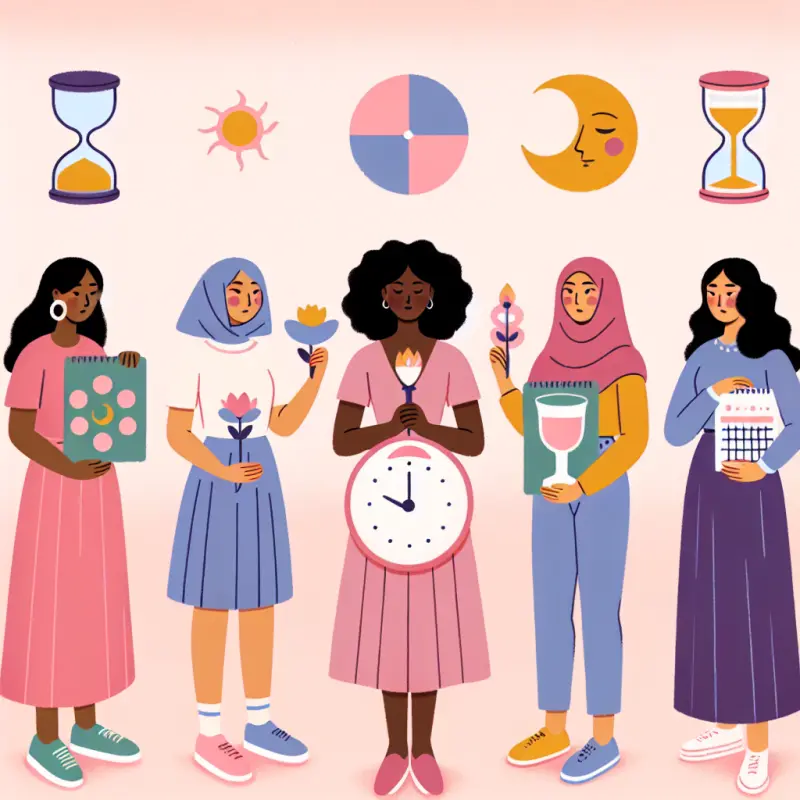Menstrual Taboos Across Cultures: Impact on Health Access

Menstrual Taboos Across Cultures: Impact on Health Access
Introduction
Menstruation is a natural biological process experienced by approximately half of the world's population at some point in their lives. Despite its universality, menstruation is often shrouded in secrecy and stigma, influenced by cultural taboos and societal norms. These taboos can shape attitudes and behaviors toward menstruation, profoundly affecting women's health and access to necessary resources. This article explores how menstrual taboos manifest across different cultures and their impact on health access, aiming to shed light on a global issue that requires urgent attention.
Understanding Menstrual Taboos
Menstrual taboos refer to the negative beliefs and practices surrounding menstruation. These taboos can be religious, cultural, or social in nature, often leading to restrictions on women's behavior, mobility, and participation in daily activities. Common misconceptions about menstruation include notions of impurity, uncleanliness, and danger, which reinforce gender discrimination and inequality.
Historical Context
- Ancient Civilizations: Historically, many ancient civilizations, such as the Greeks and Romans, held beliefs about menstruation being impure or dangerous.
- Religious Texts: Various religious texts, including those in Hinduism, Judaism, and Islam, contain references to menstruation, often prescribing specific behaviors or restrictions for menstruating women.
Cultural Variations
- Asia: In countries like India and Nepal, menstruating women may be prohibited from entering temples or participating in religious ceremonies.
- Africa: In some African communities, menstruation is surrounded by myths, such as the belief that it can cause crops to wither or milk to spoil.
- Western Cultures: Although less overt, subtle taboos persist in Western societies, where menstruation is often considered a private or embarrassing topic.
The Impact of Menstrual Taboos on Health Access
Menstrual taboos can have far-reaching implications for women's health, particularly in terms of access to healthcare, education, and hygiene products.
Healthcare Access
- Stigma and Shame: Women may feel embarrassed to seek medical advice or treatment for menstrual-related health issues due to stigma and shame.
- Lack of Information: Taboos can lead to a lack of accurate information about menstrual health, resulting in misconceptions and inadequate care.
- Cultural Barriers: In some cultures, traditional healers may be preferred over medical professionals, potentially delaying effective treatment.
Education and Awareness
- School Attendance: Menstrual taboos can lead to absenteeism among schoolgirls, particularly in regions where sanitary facilities are inadequate or absent.
- Sexual and Reproductive Health Education: Comprehensive education is often lacking, leaving young people without the knowledge needed to manage menstruation effectively.
Access to Hygiene Products
- Financial Barriers: The cost of sanitary products can be prohibitive, especially in low-income communities, leading to the use of unsafe alternatives.
- Distribution Challenges: In some areas, cultural reluctance to discuss menstruation can hinder the distribution of hygiene products.
Case Studies: Menstrual Taboos and Health Access
Nepal: The Practice of Chhaupadi
Chhaupadi is a traditional practice in parts of Nepal, where menstruating women are considered impure and are isolated in huts or sheds during their periods.
- Health Risks: Women are exposed to cold, unsanitary conditions, and the risk of animal attacks. There have been reports of deaths due to snake bites and asphyxiation from fires lit for warmth.
- Legal and Social Challenges: Despite being outlawed, Chhaupadi persists due to deep-rooted cultural beliefs and lack of enforcement.
India: Menstrual Taboos in Rural Communities
In many rural areas of India, menstruation is surrounded by myths and misconceptions.
- Access to Facilities: Many schools lack basic sanitary facilities, contributing to high dropout rates among girls.
- Government Initiatives: Efforts like the Menstrual Hygiene Scheme aim to improve access to sanitary products and awareness, but challenges remain in changing societal attitudes.
Sub-Saharan Africa: The Menstrual Hygiene Management Challenge
In many sub-Saharan African countries, menstrual hygiene management is a significant issue due to cultural taboos and resource constraints.
- Innovative Solutions: Initiatives like reusable sanitary pads and menstrual cups are being introduced to provide sustainable solutions.
- Community Engagement: Programs that engage men and boys are crucial for breaking down taboos and promoting understanding.
Strategies for Addressing Menstrual Taboos
Education and Awareness Campaigns
- Comprehensive Education: Implementing comprehensive sexual and reproductive health education in schools is vital.
- Community Workshops: Engaging communities through workshops and discussions can help dispel myths and promote openness.
Policy and Advocacy
- Government Policies: Enforcing policies that ensure access to menstrual hygiene products and facilities is essential.
- Advocacy Efforts: Advocacy groups play a crucial role in raising awareness and pushing for policy changes.
Empowerment and Support
- Support Networks: Creating support networks for women and girls can provide a safe space for sharing experiences and information.
- Empowering Women: Empowering women to challenge taboos and advocate for their rights is critical for long-term change.
Conclusion
Menstrual taboos are a pervasive issue with significant implications for women's health and access to resources. Addressing these taboos requires a multifaceted approach that includes education, policy change, and community engagement. By challenging misconceptions and promoting open dialogue, we can work towards a future where menstruation is no longer a barrier to health access and gender equality. It is crucial for governments, organizations, and individuals to collaborate in breaking down these barriers, ensuring every woman and girl can manage her menstruation with dignity and confidence.